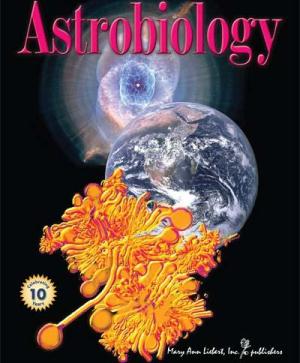
|
Astrobiology is the authoritative resource for the most up-to-date information and perspectives on exciting new research findings and discoveries emanating from interplanetary exploration and terrestrial field and laboratory research programs. The journal is published 10 times a year in print and online, and is the official journal of Astrobiology Society. Complete tables of content and a free sample issue may be viewed online.
[© Mary Ann Liebert Inc. publishers] |
Mark Bedau, Reed College (Portland, OR) and the University of Southern Denmark (Odense), relies on the Program-Metabolism-Container (PMC) model to define minimal chemical life. He supports his belief that this integrated triad of chemical systems is all that is needed for a living organism to maintain its existence, grow, reproduce, and evolve, in the essay entitled, "An Aristotelian Account of Minimal Chemical Life."
Antonio Lazcano, National Autonomous University of Mexico, and colleagues present an historical perspective of the many definitions of life put forth over the years and why they have been unsatisfactory, in the essay, "The Definition of Life: A Brief History of an Elusive Scientific Endeavor."
Steven Benner, Foundation for Applied Molecular Evolution and The Westheimer Institute for Science and Technology (Gainesville, FL), explores the various definitions of life popular in the astrobiology community and how each is connected to a "theory of life." In the essay "Defining Life," Benner describes how chemical structures capable of Darwinian evolution might be useful as universal biosignatures.
Finally, an essay adapted from the writings of deceased Ukranian scientist Sergey Tsokolov asserts that feedback loops should be an essential component of any definition of life. Life could not exist in the absence of negative feedback, concludes Tsokolov in the essay "A Theory of Circular Organization and Negative Feedback: Defining Life in a Cybernetic Context."
David Deamer commented, "These essays represent a remarkable effort on the part of the authors. We asked them to address a question that has challenged some of the great minds in biology, including Schrödinger himself, who initiated the discussion in 1944 with his book entitled "What Is Life?" Our authors rose to the challenge, and their ideas and perspectives are genuinely new. It was a pleasure to work with them and help them wrestle with this difficult and complex problem." Deamer is the new Senior Editor in charge of essays on timely topics for Astrobiology.
Led by Sherry L. Cady, PhD, Editor-in-Chief of the peer-reviewed journal Astrobiology and Professor in the Department of Geology at Portland State University, and a prominent international editorial board comprised of esteemed scientists in the field, Astrobiology is the authoritative resource for the most up-to-date information and perspectives on exciting new research findings and discoveries emanating from interplanetary exploration and terrestrial field and laboratory research programs. The Journal is published 10 times a year in print and online, and is the Official Journal of Astrobiology Society.
Mary Ann Liebert, Inc. is a privately held, fully integrated media company known for establishing authoritative peer-reviewed journals in many promising areas of science and biomedical research. Its biotechnology trade magazine, Genetic Engineering & Biotechnology News (GEN), was the first in its field and is today the industry's most widely read publication worldwide. A complete list of the firm's 60 journals, books, and newsmagazines is available at our website.



